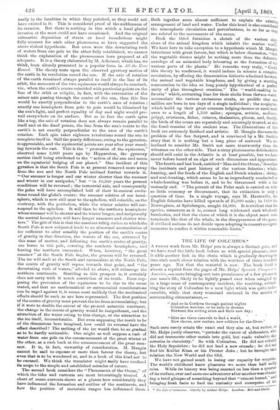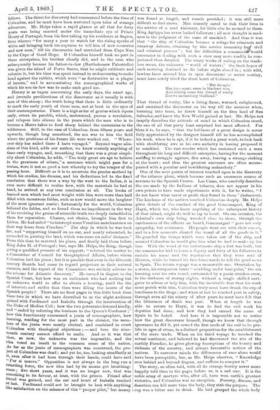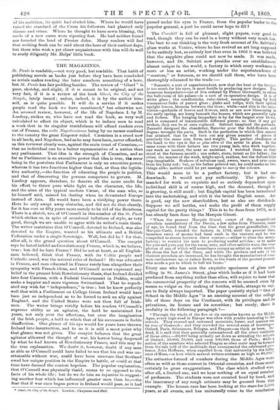THE LIFE OF COLUMBUS.*
A FRESII work from Mr. Helps' pen is always a distinct gain, awl we have read the little book before us with special pleasure, since it adds another link in the chain which is gradually drawing Us into such much closer relation with the worthies of three hundred years ago. Not that the material is new. The book itself is almost a reprint from the pages of Mr. Helps' Spanish Conquest in
America,—a mere bringing-out into prominence of a few phases in one man's life, likely to be lightly passed over when mingled up in a large mass of contemporary incident, the resetting, submitting the story of Columbus to a new light which was quite indis
cernible, while that story remained enclosed in the matrix of surrounding circumstances,— " And so in Cordova through patient nights Columbus watches, or ho sails in dreams Between the setting stars and finds new day ;
......... . "Give me throe caravels to find a world, New shores, new realms, new soldiers for the Cross."
Such men rarely attain the exact end they aim at, but rather, Si Mr. Helps justly observes, "partake the career of alchemists, who did not transmute other metals into gold, but made valuable discoveries in chemistry." So with Columbus. He did not rebuild the Holy Sepulchre ; he did not lead a new cragarle ; he' did not
find his Kublai Khan or his Prester John ; but he brought into
relation the New World and the Old. We have not gained much in losing our capacity for surprise.
The world's childhood knew pleasures we more than half aadll miss. While its history was being enacted on less than a quartet
of its surface, ever and anon one adventurer after another was obtain
ing a brief glimpse of something beyond that "utmost bound,"and bringing fresh facts to feed the curiosity and enterprise of bi fellows. The thirst for discovery had commenced before the time of Columbus, and he must have been nurtured upon tales of strange adventure. Mr. Helps takes a rapid glance at all that for forty years was being enacted under the immediate eye of Prince Henry of Portugal, from his first taking up his residence at Sagres, from whence "for many a year to watch for the rising specks of white sail bringing back his captains to tell him of new countries and new men," till his discoveries had stretched from Cape Nun to the Cape of Good Hope. If Columbus himself took no part in those enterprises, his brother clearly did, and to the man who subsequently became his father-in-law (Bartholomew Palestrello) was given the island of Porto Santo, that he might cultivate and colonize it, but his time was spent instead in endeavouring to make head against the rabbits, which were "as destructive as a plague of locusts," and in accumulating the costnographical works of which his son-in-law was to make such good use.
History is as vague concerning the early days, the exact age, and juvenile predilections of the discoverer as it usually is with men of this stamp ; the truth being that there is little ordinarily to mark the early youth of these men, not at least in the eyes of their contemporaries. There is a high order of genius which ripens early, utters its parable, which, understood, proves a revelation, and relapses into silence in the years which the man who is to become a Moses takes to feed sheep behind the mountains in the wilderness. Still, in the case of Columbus, from fifteen years and upwards, though long unnoticed, the sea was to him the field where the problems of his future life were worked oat. "Whereever ship has sailed there I have voyaged." Beyond vague allusions of this kind, adds our author, we know scarcely anything of these early voyages, and, remarking that there was a great simplicity about Columbus, he adds, "The truly great are apt to believe in the greatness of others," a sentence which might pass for a truism, were it not so good a test whereby to try the temper of the passing hour. Difficult as it is to ascertain the precise method by which his studies, his dreams, and his deductions led to the fixed conclusion that there was a way by the west to the Indies, it is even more difficult to realize how, with the materials he had at hand, he arrived at any true conclusion at all. The books of learned men which had most weight with him were more than half filled with monstrous fables, such as now would move the laughter of the most ignorant rustic ; fortunately for the world, Columbus believed the fables, and so found them no impediment in the way of his receiving the grains of scientific truth too deeply imbedded in them for separation. Chance, not choice, brought him first to Lisbon. He had sailed "to intercept some Venetian merchantmen on their way home from Flanders." The ship in which he was took fire, and "supporting himself on an oar, aud nearly exhausted, he succeeded in gaining the land, which was some six miles' distance." From this time he matured his plans, and finally laid them before King John II. of Portugal ; but, says Mr. Helps, the King, though giving a qualified promise of his support, "referred the matter to a Committee of Council for Geographical Affairs, before whom Columbus laid his plans ; but it is possible that even in the fifteenth century Boards had come to regard projectors as their natural enemies, and the report of the Committee was entirely adverse to the scheme for Atlantic discovery." He turned in disgust to the Spanish Court, but how was an enthusiast who had nothing but an unknown world to offer to obtain a hearing, amid the din of interests and strifes that then were filling the hearts of the Spanish people ? There are no finer pages in this little book than these two in which we have described to us the slight audience gained with Ferdinand and Isabella through the intervention of the Duke of Medina Celi ; how the two potentates listened kindly, and "ended by referring the business to the Queen's Confessor ;" how this functionary summoned a junta of cosmographers, how learning, residing for the most part in the cloister, the members of the junta were mostly clerical, and combined to crush Columbus with theological objections ; —and here the nineteenth century cannot afford to smile. And so it was that then, as now, the unknown was the impossible, and the Idea voted an insult to the common sense of the nation. As far as the junta of coamographers was concerned, the project of Columbus was dead ; and yet he, too, looking steadfastly at it, even after it had been through their hands, could have said 'Par si muove." Opposition is not always in the long run a retarding force, the new idea had by its means got breathingZoom; five short years, and it was no longer new, that was something in its favour, at least, with the priests. Friend after friend was gained, and the ear and heart of Isabella reached At last. Ferdinand could not be brought to look with anything hke satisfaction on the schemes of this "pauper pilot," but money
was found at length, and vessels provided ; it was still more difficult to find crews. Men scarcely cared to risk their lives in
the service of a mad visionary, for little else he seemed to them. King Agrippa has never lacked followers; all new thought is madness in the judgment of the mass of mankind. And thus it was that 'the ship of Columbus became a refuge for criminals and ruuaway debtors, obtainiug by this service immunity Int civil and criminal process " ; but the difficulties a cemmandrwould encounter in dealing with such a crew may more readily be conjectured than detailed. The weary weeks of sailing on the trackless ocean, the unknown " world of waters ;" the fresh hopes of each morning destined to die before night closed in ; with wild, lawless faces around hint in open discontent or secret mutiny, must have sorely tried the stout heart of Columbus.
But thought Has joys apart, oven in blackest woe, And seizing some fine thread of verity Knows momentary Godhead."
That thread of verity, like a living flame, warmed, enlightened, and sustained the discoverer on his way till the moment when, bursting into tears, he threw himself on the firm land of San Salvador, and knew the New World gained at last. Mr. Helps not inaptly describes the attitude of mind in which Columbus stood, the one of all that party least surprised but most affected. For ,thus it is, he says, "that the boldness of a great design is never fully appreciated by the designer himself till he has accomplished his work, when he is apt, if it be indeed a great work, to look back with shuddering awe at his own audacity in having proposed it to mankind. The vast resolve which has sustained such a man throughout his long and difficult enterprise, having for the moment nothing to struggle against, dies away, leaving a strange sinking at the heart ; and thus the greatest successes are often accompanied with a peculiar and bewildering melancholy."
One of the next points of interest touched upon is the discovery of the tobacco plant, which became such an enormous source of revenue to the Spanish Crown. Las Cases, who carefully describes the use made by the Indians of tobacco, does not appear in his own person to have made experiments with it, for he writes, "I do not know what savor or profit they found in them " (tobaccos). The kindness of the natives touched Columbus deeply. Mr. Helps gives details of the conduct of the good Guacanagari, King of Hayti, which we, who know anything of the subsequent Watery of that island, might do well to lay to heart. On one occasion, the Admiral's own ship being wrecked close to shore, through the carelessness of the officers on board, Guacauagari "gave not only sympathy, but assistance. His:people went out with their canoes, and in a few moments cleared the vessel of all the goods in it." He guarded the things which were taken out of the ship, and assured Columbus be would give hint what he had to make up his loss. With the wood of the unfortunate ship a fort was built, but the commander had to leave a deputy and forty of his followers to sustain his name and the reputation that they were sent of Heaven, while he turned his face homewards to tell the good news in Spain. The return voyage was a memorable one. Overtaken by a storm, his companion boats "scudding under bare poles," the sea bursting over his own vessel, surrounded by a panic-stricken crew, in the darkness of stormy nights, without a single skilled navigator to advise or help him, with the inevitable fear that his work must perish with him, Columbus truly must have drunk the cup of loneliness to the dregs ; and when at last he reached port in safety, through even all the misery of after years he must have felt that the bitterness of death was past. When at length be was able to return to Hayti, it was to find the evil work his deputies had done, and how they had caused the name of Spain to be hated. And here it is impossible not to notice how the great discoverer himself, though we know that through ignorance he did it, yet sowed the first seeds of the evil to be prolific in ages of crime, in a distinct proposition for the establishment of the slave trade. When on his third voyage he touched the actual continent, and believed he had discovered the site of the earthly Paradise, he gives glowing descriptions of the beauty and richness of the country, and always favourable notices of the natives. To narrower minds the differences of race alone would have been perceptible, but, as Mr. Helps observes, "Knowledge sees behind and beyond disgust, and suffices to conquer it."
The story, so often told, with all its strange beauty never more happily told than in the pages before us, is a sad one. It is the noble army of martyrs who, after all, have won earth's greatest victories, and Columbus was no exception. Poverty, disease, and desertion can kill more than the body, they stab the purpose. The cup was a bitter one to drink. He had grasped the whole body of his ambition, its spirit had eluded him. Where he would have raised the standard of the Cross his followers had planted only disease and crime. Where he thought to have sown blessing, the seeds of a new curse were ripening fast. He had neither found nor founded the land of Prester John. Many readers will feel that nothing fresh can be said about the hero of their earliest days, but those who wish a yet closer acquaintance with him will do well to study diligently Mr. Helps' little book.




































 Previous page
Previous page